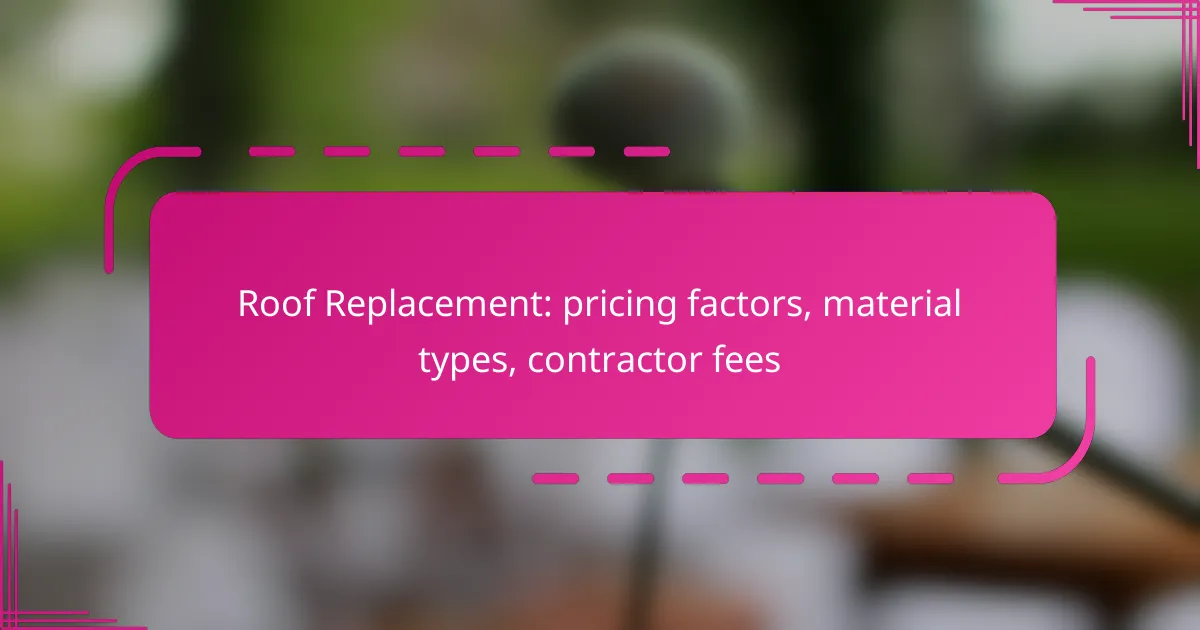Roof replacement is a significant investment that can range from several thousand to tens of thousands of dollars, influenced by factors such as material choice, labor costs, and project complexity. Selecting the right roofing material is crucial, as it impacts both the price and the longevity of the roof. Additionally, contractor fees play a vital role in the overall budget, making it essential for homeowners to understand these costs to make informed decisions.
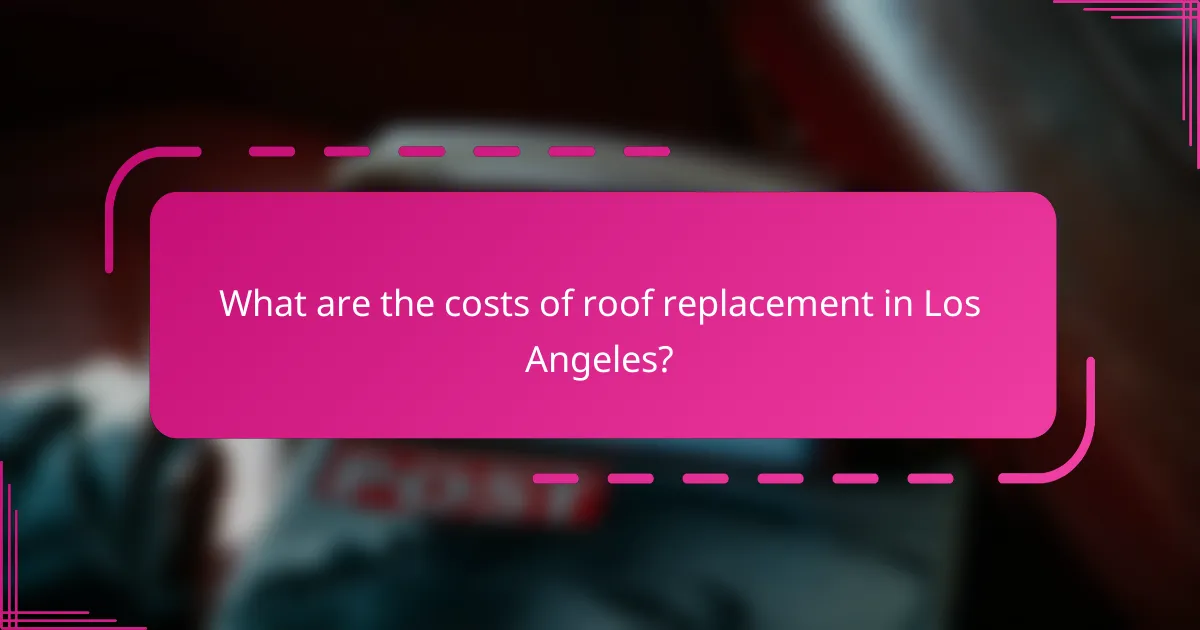
What are the costs of roof replacement in Los Angeles?
The costs of roof replacement in Los Angeles typically range from several thousand to tens of thousands of dollars, depending on various factors such as materials, labor, and the complexity of the project. Homeowners should prepare for a significant investment, as quality roofing is essential for long-term durability and protection.
Average cost range
The average cost for roof replacement in Los Angeles generally falls between $8,000 and $20,000. This range can vary based on the size of the roof and the materials chosen. For instance, a smaller home may cost closer to the lower end, while larger or more complex roofs can push costs higher.
It’s advisable to obtain multiple quotes from contractors to get a clearer picture of potential expenses. This will help ensure you receive a fair price for the work required.
Factors influencing pricing
Local building codes and permits may also impact pricing, as compliance with regulations can add to the overall expense. Homeowners should factor in these elements when budgeting for a roof replacement.
Cost breakdown by material
When selecting materials, consider the long-term benefits and maintenance requirements. Higher upfront costs for durable materials may lead to savings over time due to lower maintenance and replacement needs.
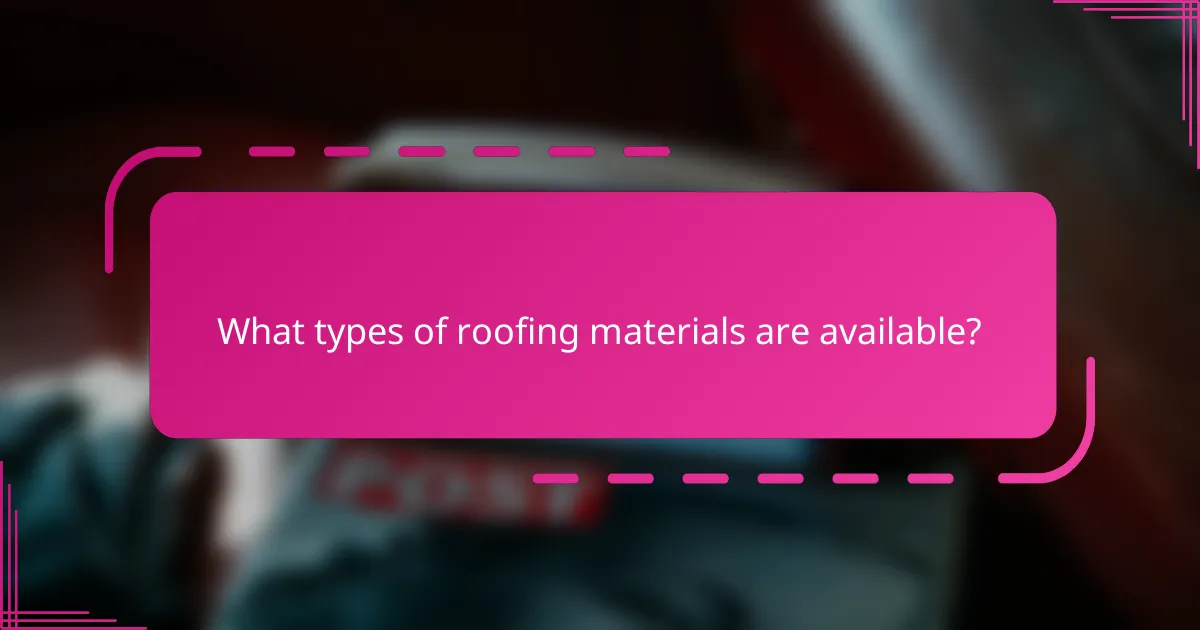
What types of roofing materials are available?
There are several types of roofing materials available, each with unique characteristics, costs, and benefits. The choice of material can significantly affect the overall price of a roof replacement and its longevity.
Asphalt shingles
Asphalt shingles are one of the most popular roofing materials due to their affordability and ease of installation. They typically cost between $90 and $100 per square (100 square feet) and come in a variety of colors and styles.
These shingles are durable, with a lifespan of about 20 to 30 years, depending on the quality. However, they may not perform as well in extreme weather conditions compared to other materials.
Metal roofing
Metal roofing is gaining popularity for its longevity and energy efficiency. Prices generally range from $300 to $700 per square, depending on the type of metal used, such as steel, aluminum, or copper.
Metal roofs can last 40 to 70 years and are highly resistant to wind, fire, and rot. They can also reflect solar heat, potentially lowering energy costs. However, installation can be more complex and may require specialized contractors.
Tile roofing
Tile roofing, often made from clay or concrete, is known for its aesthetic appeal and durability. The cost typically ranges from $600 to $1,200 per square, making it one of the more expensive options.
Tile roofs can last over 50 years and are excellent at withstanding harsh weather. However, they are heavy and may require additional structural support, which can increase installation costs.
Wood shakes
Wood shakes offer a natural look and good insulation properties, typically costing between $300 and $600 per square. They are made from cedar, redwood, or other types of wood and can last around 30 years with proper maintenance.
However, wood shakes require regular upkeep to prevent rot and insect damage, and they may not be suitable for areas prone to wildfires. It’s essential to check local building codes, as some regions have restrictions on wood roofing materials.
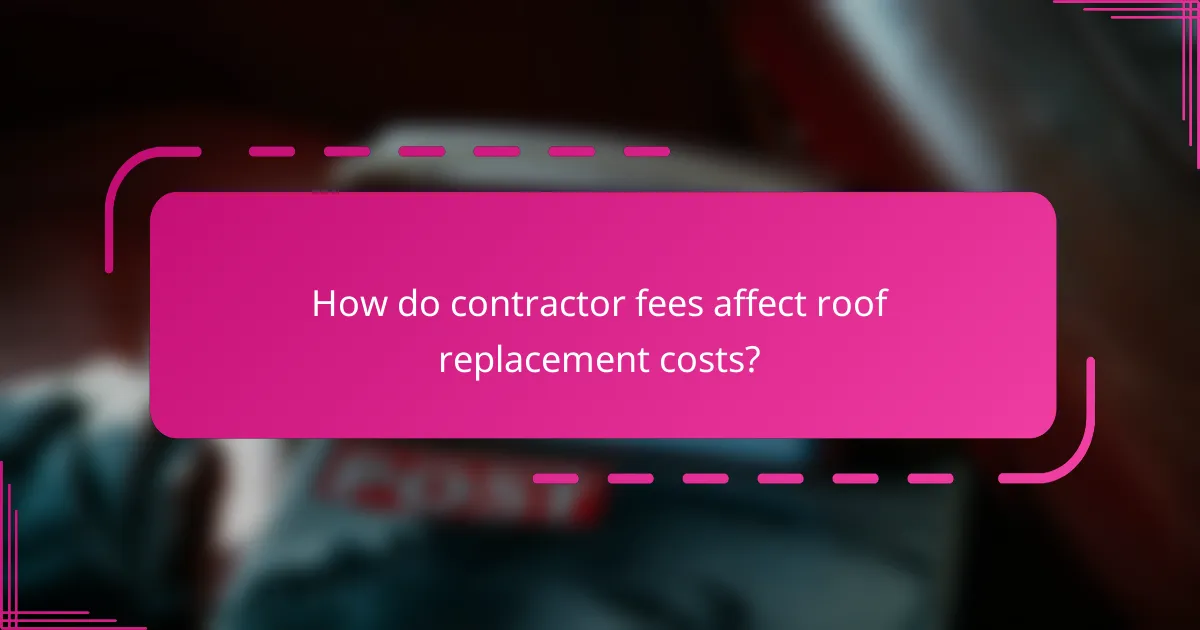
How do contractor fees affect roof replacement costs?
Contractor fees significantly influence the overall cost of roof replacement, often accounting for a substantial portion of the budget. Understanding these fees can help homeowners make informed decisions and manage their expenses effectively.
Typical contractor fees
Contractor fees for roof replacement typically range from 10% to 20% of the total project cost, depending on various factors such as location and the complexity of the job. For instance, in the United States, homeowners might expect to pay between $1,500 and $3,000 for contractor services on a standard residential roof.
Some contractors may charge a flat fee, while others might bill hourly. It’s essential to clarify the payment structure upfront to avoid unexpected charges later on.
Factors affecting contractor pricing
Several factors can influence contractor pricing for roof replacement. These include the contractor’s experience, the type of roofing material chosen, and the geographical location of the project. For example, contractors in urban areas may charge higher fees due to increased demand and living costs.
Additionally, the complexity of the roof design, such as multiple slopes or intricate features, can lead to higher labor costs. Homeowners should also consider the time of year, as demand for roofing services often peaks in spring and summer, potentially driving up prices.
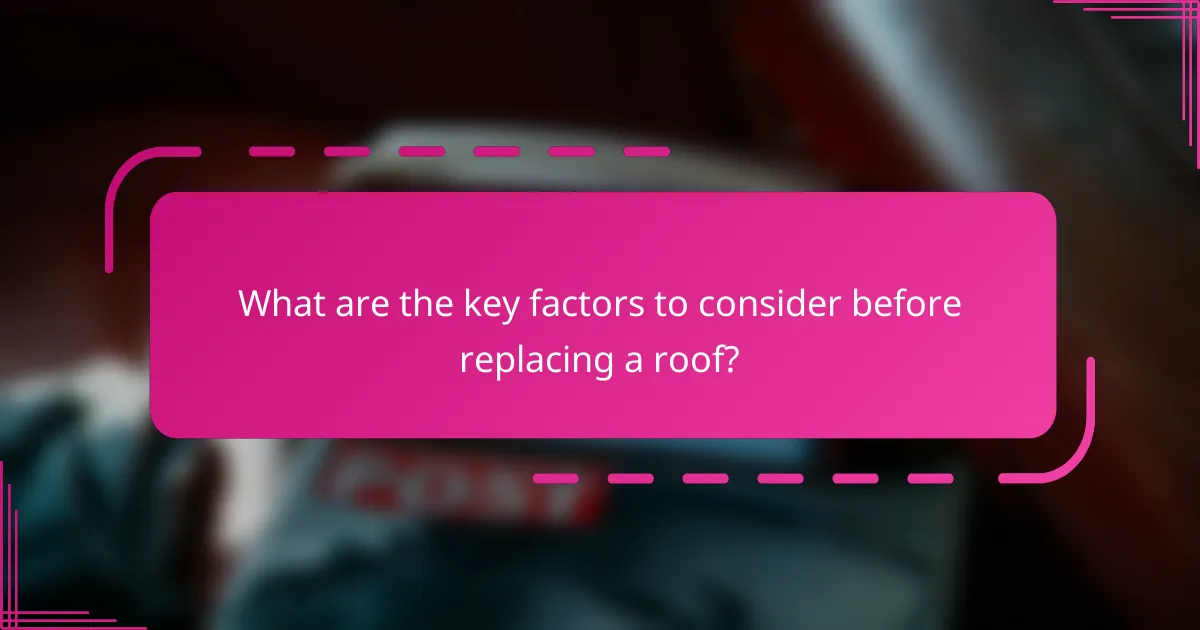
What are the key factors to consider before replacing a roof?
Before replacing a roof, it is essential to evaluate factors such as the roof’s age and condition, local building codes, and weather considerations. These elements significantly influence the overall cost, material choice, and installation process.
Roof age and condition
The age and condition of your roof are critical in determining whether a replacement is necessary. Generally, roofs have a lifespan ranging from 15 to 50 years, depending on the material used. If your roof is nearing the end of its life or shows significant wear, replacement may be the best option.
Inspect for signs of damage, such as missing shingles, leaks, or sagging areas. If repairs are frequent and costly, it may be more economical to invest in a new roof rather than continuing patchwork fixes.
Local building codes
Local building codes dictate the standards for roofing materials and installation practices in your area. These regulations ensure safety and compliance, so it’s crucial to familiarize yourself with them before starting a roof replacement project.
Check with your local government or building department for specific requirements, such as permits or inspections. Non-compliance can lead to fines and complications when selling your home in the future.
Weather considerations
Weather conditions in your region play a significant role in roof replacement decisions. Areas with heavy rainfall, snow, or extreme temperatures may require specific materials designed to withstand these elements, impacting both cost and longevity.
For instance, in regions prone to heavy snowfall, a steeper roof pitch may be necessary to prevent snow accumulation. Conversely, in hotter climates, reflective roofing materials can help reduce cooling costs. Always consider local weather patterns when selecting roofing materials and designs.

How to choose the right roofing contractor?
Choosing the right roofing contractor involves evaluating their qualifications, obtaining several estimates, and reviewing their reputation. This process ensures you select a reliable professional who meets your specific roofing needs and budget.
Researching credentials
Start by verifying the contractor’s credentials, including licenses and insurance. A reputable contractor should have a valid license to operate in your state and carry liability insurance to protect you from potential damages during the project.
Check for any certifications from roofing manufacturers, which indicate that the contractor is trained to install specific roofing materials correctly. This can be a good sign of their expertise and commitment to quality work.
Getting multiple quotes
Obtaining multiple quotes is essential to understand the market rates for your roofing project. Aim for at least three estimates from different contractors to compare pricing, materials, and timelines.
When reviewing quotes, ensure they include detailed breakdowns of labor, materials, and any additional fees. This transparency helps you make informed decisions and avoid unexpected costs later on.
Checking reviews and references
Research online reviews and ask for references from past clients to gauge a contractor’s reliability and quality of work. Websites like Yelp, Google Reviews, and the Better Business Bureau can provide valuable insights into customer experiences.
Contact references directly to inquire about their satisfaction with the contractor’s work, adherence to timelines, and overall professionalism. This step can help you avoid potential pitfalls and choose a trustworthy contractor for your roofing needs.
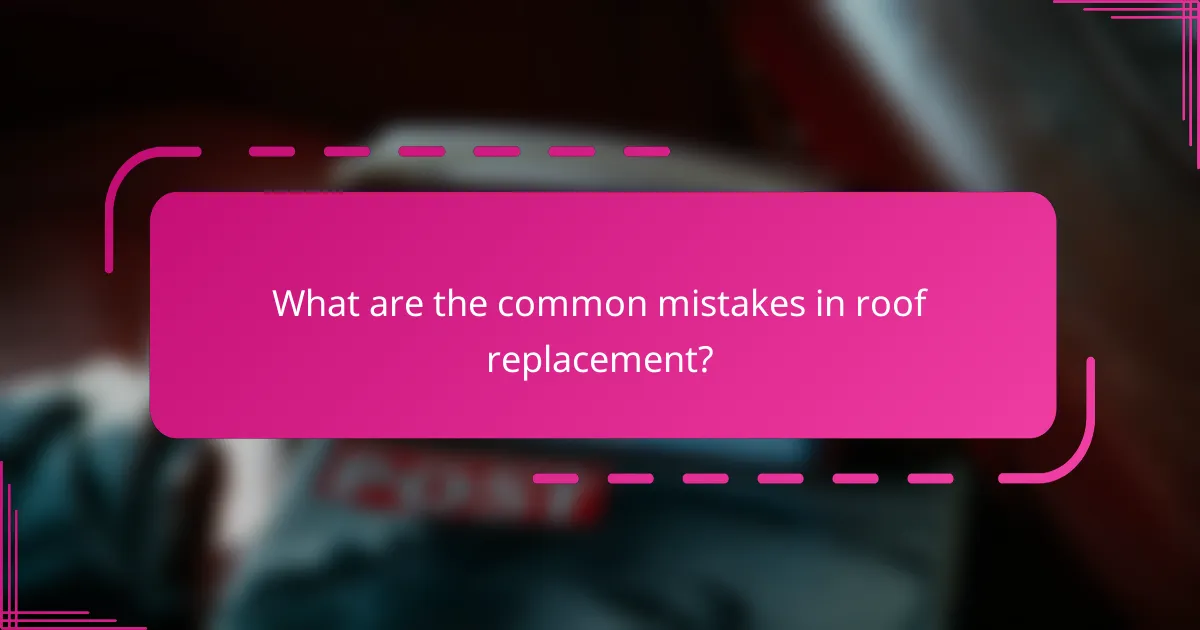
What are the common mistakes in roof replacement?
Common mistakes in roof replacement include inadequate planning, choosing the wrong materials, and hiring unqualified contractors. These errors can lead to increased costs, safety hazards, and reduced lifespan of the roof.
Inadequate Planning
Failing to plan properly can result in unexpected expenses and delays. Homeowners should assess their budget, timeline, and specific needs before starting the project. This includes obtaining necessary permits and understanding local building codes.
Choosing the Wrong Materials
Selecting inappropriate roofing materials can compromise durability and aesthetics. It’s crucial to consider factors such as climate, roof slope, and home style when choosing materials. For instance, asphalt shingles may be suitable for many regions, while metal roofing might be better for areas with heavy snowfall.
Hiring Unqualified Contractors
Hiring inexperienced or unlicensed contractors can lead to poor workmanship and potential legal issues. Always verify credentials, check references, and read reviews before making a decision. A qualified contractor will ensure compliance with local regulations and provide warranties on their work.
